中外神话对比
- 格式:doc
- 大小:28.00 KB
- 文档页数:3
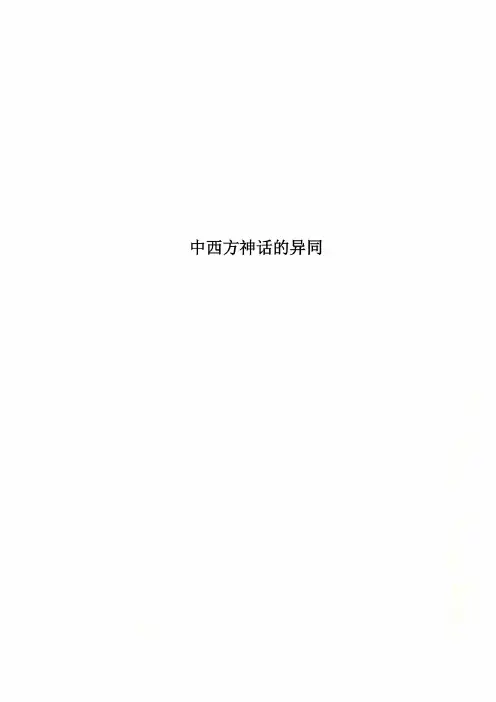
中西方神话也有很多不同之处。
腊神话中的神祗像人一样,有情欲,有善恶,有计谋,互有血缘关系,都是人格化了的形象。
如西方很多艺术大师创作的以希腊神话为题材的油画作品中,女神们都是和蔼,温暖的美丽女人,天使就是长了一对翅膀的可爱孩童,如天父宙斯就经常下界追逐引诱凡间女子,而他的妻子赫拉则如同一个妒忌心极强的女人一样迫害她的情敌。
这些都反映出神和人的共通性.但神祗和人的区别也很明显:长生不老,可随意变形,各具特殊本领和巨大威力,其好恶态度对下界人类的生杀祸福起着决定作用。
其中地位最显赫的神是居住在奥林匹斯山上的十二个主神。
英雄传说中的英雄都是神和人所生的后代,是半神半人的,具有过人的才能和非凡的毅力。
英雄传说以不同的家族为中心形成许多系统,主要包括赫拉克利特的传说,忒修斯的传说,伊阿宋的传说等等。
希腊神话是在漫长的历史时期内逐渐形成的,神的性格和职责以及故事情节都有发展变化。
可以说古希腊神话是整个西方文学的源头,后世几乎所有的作家都曾从古老的神话中汲取养分东方神话故事中的神都是高高在上的,比如佛教中的如来佛祖,掌控着世间万物,无所不知,无所不能,笼罩着一层神秘的面纱,好像人们永远无法企及到那个高度。
神话故事里各路菩萨,为唐僧布下九九八十一难,在我看来,在我看来,人类可以被那些所谓的神无限的戏耍,人类在那些神眼里就是蝼蚁一般的存在。
在中国,这种无限的夸大的神的力量是与西方截然不同的。
牛郎织女的故事可谓家喻户晓,七七鹊桥会,是中国人心中的情人节,人们渴望美好的爱情,渴望团圆。
织女是天上的神,牛郎是人间的凡人,在中国神与人等级是森严的,中国有句成语叫做“人鬼殊途”在某方面就反映出了这个等级森严的“制度”。
东西方文明的差异其在当代人中的首观点是西方人性的自由化和东方以等级著称的森严体制。
所以在西方神话中诸神是生活在凡间的某个地方,还有很多是跟人生活在一起。
普通人可以找到这个地方走上去;作为中国的神话,我们的神高高凌驾于人之上,普通人永远无法接近。

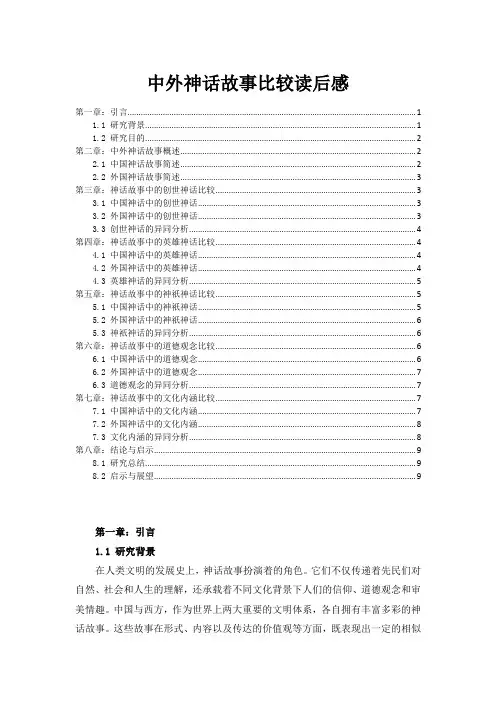
中外神话故事比较读后感第一章:引言 (1)1.1 研究背景 (1)1.2 研究目的 (2)第二章:中外神话故事概述 (2)2.1 中国神话故事简述 (2)2.2 外国神话故事简述 (3)第三章:神话故事中的创世神话比较 (3)3.1 中国神话中的创世神话 (3)3.2 外国神话中的创世神话 (3)3.3 创世神话的异同分析 (4)第四章:神话故事中的英雄神话比较 (4)4.1 中国神话中的英雄神话 (4)4.2 外国神话中的英雄神话 (4)4.3 英雄神话的异同分析 (5)第五章:神话故事中的神祇神话比较 (5)5.1 中国神话中的神祇神话 (5)5.2 外国神话中的神祇神话 (6)5.3 神祇神话的异同分析 (6)第六章:神话故事中的道德观念比较 (6)6.1 中国神话中的道德观念 (6)6.2 外国神话中的道德观念 (7)6.3 道德观念的异同分析 (7)第七章:神话故事中的文化内涵比较 (7)7.1 中国神话中的文化内涵 (7)7.2 外国神话中的文化内涵 (8)7.3 文化内涵的异同分析 (8)第八章:结论与启示 (9)8.1 研究总结 (9)8.2 启示与展望 (9)第一章:引言1.1 研究背景在人类文明的发展史上,神话故事扮演着的角色。
它们不仅传递着先民们对自然、社会和人生的理解,还承载着不同文化背景下人们的信仰、道德观念和审美情趣。
中国与西方,作为世界上两大重要的文明体系,各自拥有丰富多彩的神话故事。
这些故事在形式、内容以及传达的价值观等方面,既表现出一定的相似性,又存在显著的差异。
神话故事是人类早期文化的重要组成部分,对后世文学、艺术、哲学等领域产生了深远的影响。
全球化时代的到来,跨文化交流日益频繁,比较研究中外神话故事,探讨其异同,有助于我们更好地理解不同文化背景下的价值观念和思维模式。
1.2 研究目的本研究旨在通过对中外神话故事的比较,分析其在主题、结构、人物形象等方面的异同,挖掘其中蕴含的哲学思想、道德观念和审美意识。
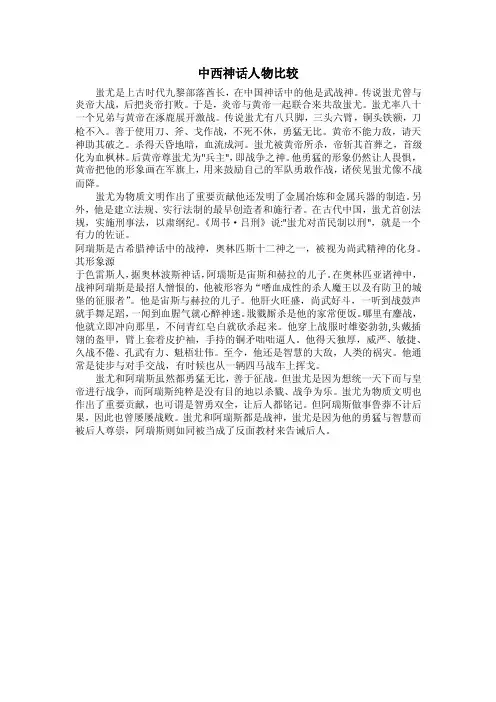
中西神话人物比较蚩尤是上古时代九黎部落酋长,在中国神话中的他是武战神。
传说蚩尤曾与炎帝大战,后把炎帝打败。
于是,炎帝与黄帝一起联合来共敌蚩尤。
蚩尤率八十一个兄弟与黄帝在涿鹿展开激战。
传说蚩尤有八只脚,三头六臂,铜头铁额,刀枪不入。
善于使用刀、斧、戈作战,不死不休,勇猛无比。
黄帝不能力敌,请天神助其破之。
杀得天昏地暗,血流成河。
蚩尤被黄帝所杀,帝斩其首葬之,首级化为血枫林。
后黄帝尊蚩尤为"兵主",即战争之神。
他勇猛的形象仍然让人畏惧,黄帝把他的形象画在军旗上,用来鼓励自己的军队勇敢作战,诸侯见蚩尤像不战而降。
蚩尤为物质文明作出了重要贡献他还发明了金属冶炼和金属兵器的制造。
另外,他是建立法规、实行法制的最早创造者和施行者。
在古代中国,蚩尤首创法规,实施刑事法,以肃纲纪。
《周书·吕刑》说:"蚩尤对苗民制以刑",就是一个有力的佐证。
阿瑞斯是古希腊神话中的战神,奥林匹斯十二神之一,被视为尚武精神的化身。
其形象源于色雷斯人,据奥林波斯神话,阿瑞斯是宙斯和赫拉的儿子。
在奥林匹亚诸神中,战神阿瑞斯是最招人憎恨的,他被形容为“嗜血成性的杀人魔王以及有防卫的城堡的征服者”。
他是宙斯与赫拉的儿子。
他肝火旺盛,尚武好斗,一听到战鼓声就手舞足蹈,一闻到血腥气就心醉神迷。
戕戮厮杀是他的家常便饭。
哪里有鏖战,他就立即冲向那里,不问青红皂白就砍杀起来。
他穿上战服时雄姿勃勃,头戴插翎的盔甲,臂上套着皮护袖,手持的铜矛咄咄逼人。
他得天独厚,威严、敏捷、久战不倦、孔武有力、魁梧壮伟。
至今,他还是智慧的大敌,人类的祸灾。
他通常是徒步与对手交战,有时候也从一辆四马战车上挥戈。
蚩尤和阿瑞斯虽然都勇猛无比,善于征战。
但蚩尤是因为想统一天下而与皇帝进行战争,而阿瑞斯纯粹是没有目的地以杀戮、战争为乐。
蚩尤为物质文明也作出了重要贡献,也可谓是智勇双全,让后人都铭记。
但阿瑞斯做事鲁莽不计后果,因此也曾屡屡战败。
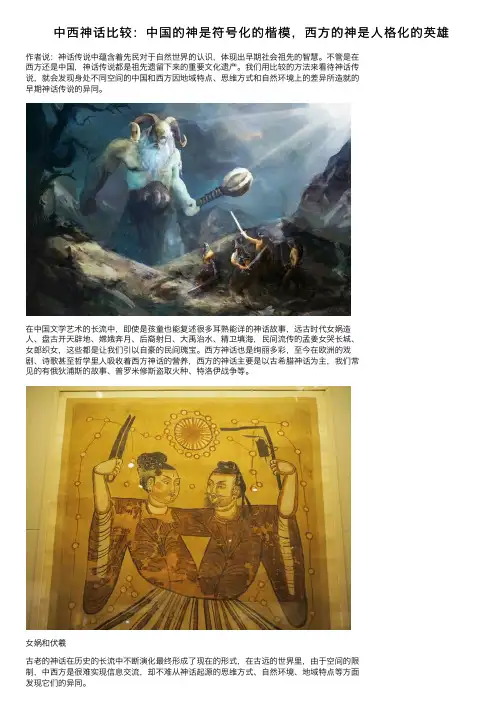
中西神话⽐较:中国的神是符号化的楷模,西⽅的神是⼈格化的英雄作者说:神话传说中蕴含着先民对于⾃然世界的认识,体现出早期社会祖先的智慧。
不管是在西⽅还是中国,神话传说都是祖先遗留下来的重要⽂化遗产。
我们⽤⽐较的⽅法来看待神话传说,就会发现⾝处不同空间的中国和西⽅因地域特点、思维⽅式和⾃然环境上的差异所造就的早期神话传说的异同。
在中国⽂学艺术的长流中,即使是孩童也能复述很多⽿熟能详的神话故事,远古时代⼥娲造⼈、盘古开天辟地、嫦娥奔⽉、后裔射⽇、⼤禹治⽔、精卫填海,民间流传的孟姜⼥哭长城、⼥郎织⼥,这些都是让我们引以⾃豪的民间瑰宝。
西⽅神话也是绚丽多彩,⾄今在欧洲的戏剧、诗歌甚⾄哲学⾥⼈吸收着西⽅神话的营养,西⽅的神话主要是以古希腊神话为主,我们常见的有俄狄浦斯的故事、普罗⽶修斯盗取⽕种、特洛伊战争等。
⼥娲和伏羲古⽼的神话在历史的长流中不断演化最终形成了现在的形式,在古远的世界⾥,由于空间的限制,中西⽅是很难实现信息交流,却不难从神话起源的思维⽅式、⾃然环境、地域特点等⽅⾯发现它们的异同。
中西创世神话中神造⼈有着相似情节从神话的题材上来看,中西创世神话中神造⼈有很强的相似性。
他们都认为⼈是神创造的,并且是由⼟⽽⽣。
在中国,创世神话最流传最⼴的是⼥娲造⼈和盘古开天辟地,⽽在西⽅则有《圣经》中的上帝⽤泥⼟按照⾃⼰的模样创造了⼈类和普罗⽶修斯造⼈。
根据《风俗通》记载:俗说天地开辟,未有⼈民,⼥娲抟黄⼟做⼈,剧务,⼒不暇供,乃引绳泥⼟中举以为⼈。
故富者黄⼟⼈也,贫贱凡庸者,絙⼈也。
也就是说⼥娲运⽤泥⼟照着河⽔⾥⾃⼰的倒影捏造⼈形,创造⼈累,后来由于太累了,便随⼿扯了⼀条绳⼦深⼊泥潭,沾上泥浆向地上挥洒⽽去,结果点点泥浆就变成了⼈的摸样,后来⼥娲看到了⼈终将死去,⽆法传承,就分出男⼥,创造婚姻制度。
并且还将⼈分成了等级。
西⽅神话中也有很多神创造⼈的传说,流传最⼴的莫过于⽕神普罗⽶修斯创造⼈类的故事。
普罗⽶修斯有⼀天知道了天神将种⼦藏于泥⼟中的秘密,于是他就捧起泥⼟,沾上河⽔,按照天神的模样捏泥成⼈,他还从动物设上摄取善恶灵魂,封印在⼈的⾝体⾥。
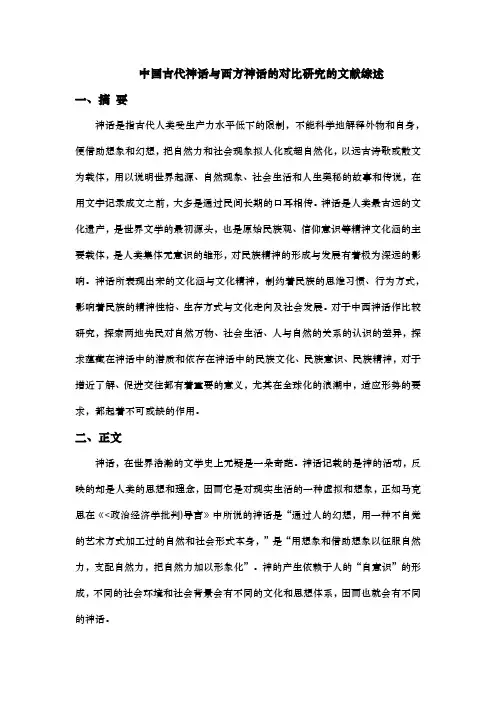
中国古代神话与西方神话的对比研究的文献综述一、摘要神话是指古代人类受生产力水平低下的限制,不能科学地解释外物和自身,便借助想象和幻想,把自然力和社会现象拟人化或超自然化,以远古诗歌或散文为载体,用以说明世界起源、自然现象、社会生活和人生奥秘的故事和传说,在用文字记录成文之前,大多是通过民间长期的口耳相传。
神话是人类最古远的文化遗产,是世界文学的最初源头,也是原始民族观、信仰意识等精神文化涵的主要载体,是人类集体无意识的雏形,对民族精神的形成与发展有着极为深远的影响。
神话所表现出来的文化涵与文化精神,制约着民族的思维习惯、行为方式,影响着民族的精神性格、生存方式与文化走向及社会发展。
对于中西神话作比较研究,探索两地先民对自然万物、社会生活、人与自然的关系的认识的差异,探求蕴藏在神话中的潜质和依存在神话中的民族文化、民族意识、民族精神,对于增近了解、促进交往都有着重要的意义,尤其在全球化的浪潮中,适应形势的要求,都起着不可或缺的作用。
二、正文神话,在世界浩瀚的文学史上无疑是一朵奇葩。
神话记载的是神的活动,反映的却是人类的思想和理念,因而它是对现实生活的一种虚拟和想象,正如马克思在《<政治经济学批判)导言》中所说的神话是“通过人的幻想,用一种不自觉的艺术方式加工过的自然和社会形式本身,”是“用想象和借助想象以征服自然力,支配自然力,把自然力加以形象化”。
神的产生依赖于人的“自意识”的形成,不同的社会环境和社会背景会有不同的文化和思想体系,因而也就会有不同的神话。
中国神话传说主要是指汉族的一些神话传说,道教的、佛教的以及远古的神话。
而西方神话传说则主要包括古希腊神话和《圣经•旧约》。
1、主题上的相似(1)神话都有十分相似的主题: 世界起源、人类起源、灵魂不灭、祖先崇拜、生殖崇拜、图腾崇拜等等。
如关于天地人类的起源,中国神话中盘古生于浑沌之中, 开天辟地。
女娲补天,传土作人。
古希腊神话中卡俄斯与妻子浑沌之中先创光与昼, 然后创天地,天地生神族,神塑土作人。
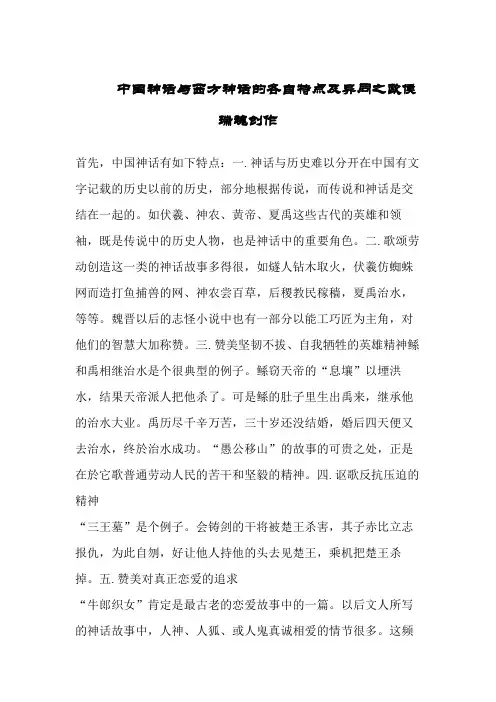
中国神话与西方神话的各自特点及异同之欧侯瑞魂创作首先,中国神话有如下特点:一.神话与历史难以分开在中国有文字记载的历史以前的历史,部分地根据传说,而传说和神话是交结在一起的。
如伏羲、神农、黄帝、夏禹这些古代的英雄和领袖,既是传说中的历史人物,也是神话中的重要角色。
二.歌颂劳动创造这一类的神话故事多得很,如燧人钻木取火,伏羲仿蜘蛛网而造打鱼捕兽的网、神农尝百草,后稷教民稼穑,夏禹治水,等等。
魏晋以后的志怪小说中也有一部分以能工巧匠为主角,对他们的智慧大加称赞。
三.赞美坚韧不拔、自我牺牲的英雄精神鲧和禹相继治水是个很典型的例子。
鲧窃天帝的“息壤”以堙洪水,结果天帝派人把他杀了。
可是鲧的肚子里生出禹来,继承他的治水大业。
禹历尽千辛万苦,三十岁还没结婚,婚后四天便又去治水,终於治水成功。
“愚公移山”的故事的可贵之处,正是在於它歌普通劳动人民的苦干和坚毅的精神。
四.讴歌反抗压迫的精神“三王墓”是个例子。
会铸剑的干将被楚王杀害,其子赤比立志报仇,为此自刎,好让他人持他的头去见楚王,乘机把楚王杀掉。
五.赞美对真正恋爱的追求“牛郎织女”肯定是最古老的恋爱故事中的一篇。
以后文人所写的神话故事中,人神、人狐、或人鬼真诚相爱的情节很多。
这频故事曲折地反映了在封建礼教压迫下人们对真正恋爱的追求和向往。
六.劝善惩恶在魏晋以后的志怪小说中这是个重要的主题。
可能是受儒家关於仁义道德的教导和佛家的“善有善报,恶有恶报”思想的影响,许多文人创作的故事都有人皆应做好事,不该做坏事的寓意。
例如董永是个勤劳、诚恳、又孝顺父亲的好人,所以天帝就派仙女来帮忙他。
而那些做坏事的人、神、鬼、怪,到头来都自作自受,没有好结果的。
当然也有一些故事宣扬宿命论、轮迥说、或各种封建的伦理道德。
这其实不奇怪,因为文艺作品不成防止地要反映一个时代的思想。
再看西方神话的特点:西方神话人物关系谱分为早期的神祗、十二主神、其他神祗、非人生物、人类和半神人。
这些主要是希腊神话中的,所以西方神话的特点就是希腊神话的特点。
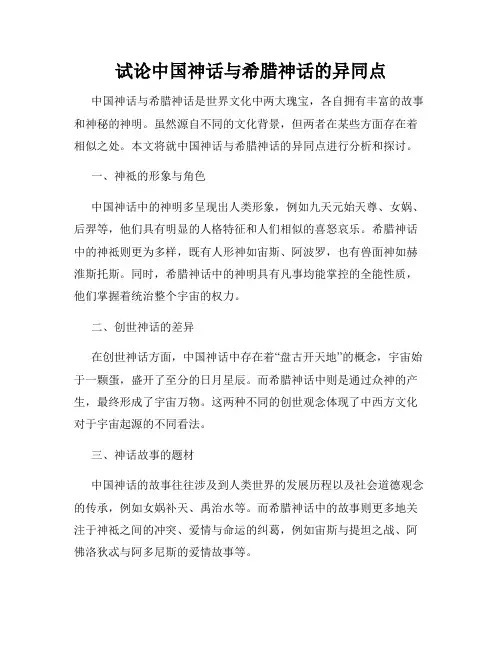
试论中国神话与希腊神话的异同点中国神话与希腊神话是世界文化中两大瑰宝,各自拥有丰富的故事和神秘的神明。
虽然源自不同的文化背景,但两者在某些方面存在着相似之处。
本文将就中国神话与希腊神话的异同点进行分析和探讨。
一、神祗的形象与角色中国神话中的神明多呈现出人类形象,例如九天元始天尊、女娲、后羿等,他们具有明显的人格特征和人们相似的喜怒哀乐。
希腊神话中的神祗则更为多样,既有人形神如宙斯、阿波罗,也有兽面神如赫淮斯托斯。
同时,希腊神话中的神明具有凡事均能掌控的全能性质,他们掌握着统治整个宇宙的权力。
二、创世神话的差异在创世神话方面,中国神话中存在着“盘古开天地”的概念,宇宙始于一颗蛋,盛开了至分的日月星辰。
而希腊神话中则是通过众神的产生,最终形成了宇宙万物。
这两种不同的创世观念体现了中西方文化对于宇宙起源的不同看法。
三、神话故事的题材中国神话的故事往往涉及到人类世界的发展历程以及社会道德观念的传承,例如女娲补天、禹治水等。
而希腊神话中的故事则更多地关注于神祗之间的冲突、爱情与命运的纠葛,例如宙斯与提坦之战、阿佛洛狄忒与阿多尼斯的爱情故事等。
四、神话中的道德观念中国神话中所讲述的故事往往含有深刻的道德寓意,它们希望借助神话的故事激励人们积极向上地面对生活。
例如《封神演义》中展现了忠诚与背叛、善与恶之间的对立;《山海经》则告诫人们要尊重大自然。
而希腊神话中的道德观念相对较为模糊,其故事更多地展现了人类的弱点和欲望。
五、文化影响的差异中国神话对于中国文化影响深远,不仅为人们的价值观念提供了指导,还对于文学、艺术等领域有着重要的影响。
其中《西游记》、《红楼梦》等被称为中国四大名著,均融入了大量的神话元素。
而希腊神话则对于西方文化影响较大,这些神话成为了西方文学、艺术和哲学的重要源泉。
从以上几个方面来看,中国神话与希腊神话在形象、角色、创世观念、题材、道德观念以及文化影响等方面存在一定的异同。
这些不同点体现了两种文化对于宇宙、人类和道德的不同理解。
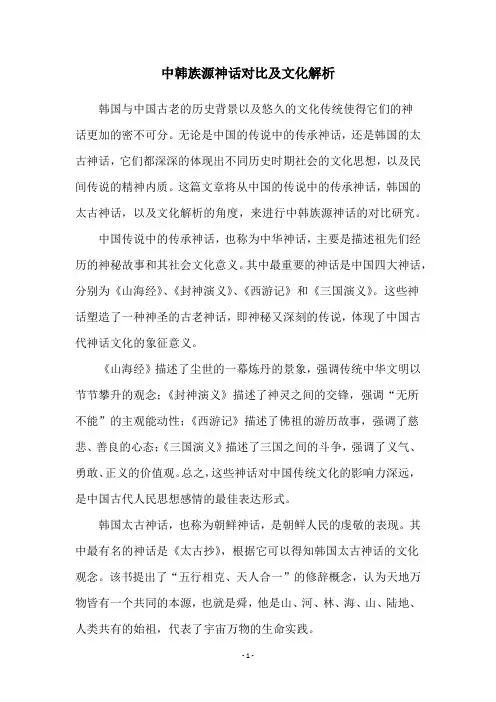
中韩族源神话对比及文化解析韩国与中国古老的历史背景以及悠久的文化传统使得它们的神话更加的密不可分。
无论是中国的传说中的传承神话,还是韩国的太古神话,它们都深深的体现出不同历史时期社会的文化思想,以及民间传说的精神内质。
这篇文章将从中国的传说中的传承神话,韩国的太古神话,以及文化解析的角度,来进行中韩族源神话的对比研究。
中国传说中的传承神话,也称为中华神话,主要是描述祖先们经历的神秘故事和其社会文化意义。
其中最重要的神话是中国四大神话,分别为《山海经》、《封神演义》、《西游记》和《三国演义》。
这些神话塑造了一种神圣的古老神话,即神秘又深刻的传说,体现了中国古代神话文化的象征意义。
《山海经》描述了尘世的一幕炼丹的景象,强调传统中华文明以节节攀升的观念;《封神演义》描述了神灵之间的交锋,强调“无所不能”的主观能动性;《西游记》描述了佛祖的游历故事,强调了慈悲、善良的心态;《三国演义》描述了三国之间的斗争,强调了义气、勇敢、正义的价值观。
总之,这些神话对中国传统文化的影响力深远,是中国古代人民思想感情的最佳表达形式。
韩国太古神话,也称为朝鲜神话,是朝鲜人民的虔敬的表现。
其中最有名的神话是《太古抄》,根据它可以得知韩国太古神话的文化观念。
该书提出了“五行相克、天人合一”的修辞概念,认为天地万物皆有一个共同的本源,也就是舜,他是山、河、林、海、山、陆地、人类共有的始祖,代表了宇宙万物的生命实践。
另外,《太古抄》还提出了“民之始终,天之受引”的文化观念,认为民族的发展需要天地支持,在天地的帮助下人们才能发展。
这种文化观念深深地影响了韩国人的价值观,使得人们更加重视与自然的联系,体现出对自然的尊重和谨慎。
通过对比,我们发现,中国传说中的传承神话和韩国太古神话在文化观念上有许多相似之处。
无论是神秘又深刻的传说,还是“五行相克、天人合一”和“民之始终,天之受引”的观念,它们都表明两个文化的深度相通。
正是这些文化观念融合和对比,使得中韩族源神话更加的诱人和神奇。
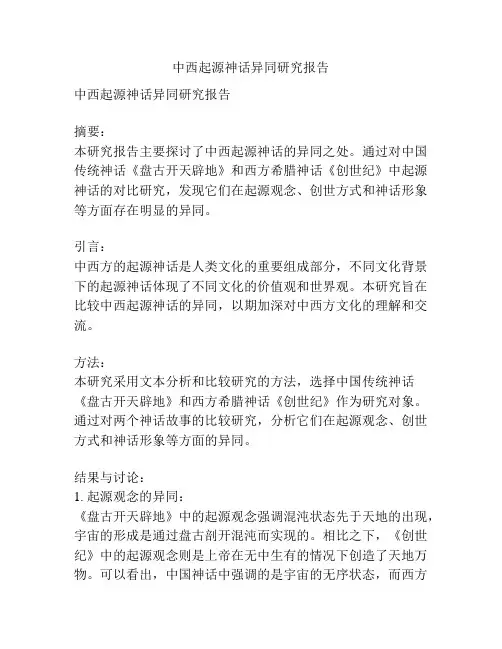
中西起源神话异同研究报告中西起源神话异同研究报告摘要:本研究报告主要探讨了中西起源神话的异同之处。
通过对中国传统神话《盘古开天辟地》和西方希腊神话《创世纪》中起源神话的对比研究,发现它们在起源观念、创世方式和神话形象等方面存在明显的异同。
引言:中西方的起源神话是人类文化的重要组成部分,不同文化背景下的起源神话体现了不同文化的价值观和世界观。
本研究旨在比较中西起源神话的异同,以期加深对中西方文化的理解和交流。
方法:本研究采用文本分析和比较研究的方法,选择中国传统神话《盘古开天辟地》和西方希腊神话《创世纪》作为研究对象。
通过对两个神话故事的比较研究,分析它们在起源观念、创世方式和神话形象等方面的异同。
结果与讨论:1. 起源观念的异同:《盘古开天辟地》中的起源观念强调混沌状态先于天地的出现,宇宙的形成是通过盘古剖开混沌而实现的。
相比之下,《创世纪》中的起源观念则是上帝在无中生有的情况下创造了天地万物。
可以看出,中国神话中强调的是宇宙的无序状态,而西方神话则强调宇宙的创造过程。
2. 创世方式的异同:《盘古开天辟地》中,盘古通过剖开混沌以形成天地,持续了一万八千年才陨落。
与之相反,《创世纪》中的上帝通过一系列的命令和创造活动,花费了六天的时间才完成了整个创世过程。
可以看出,中西方神话对于创世过程的描写方式存在明显的差异。
3. 神话形象的异同:《盘古开天辟地》中的盘古是一个古老的巨人,具有神圣的力量和智慧,在创造宇宙的过程中发挥了重要的作用。
而《创世纪》中的上帝则是无形的存在,通过命令和创造来实现创世。
可以看出,中西神话中的主要神话形象存在一定的差异。
结论:通过对中西起源神话的比较研究,我们发现它们在起源观念、创世方式和神话形象等方面存在明显的异同。
中西方的起源神话反映了不同文化的价值观和世界观,研究和对比这些神话有助于加深对中西方文化的理解和推动文化交流的发展。
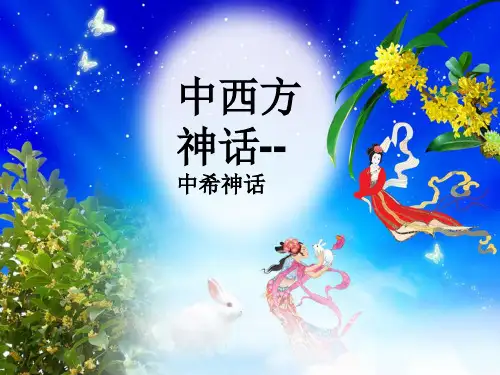
神话是远古时代人们通过超自然的形象和幻想的形式,表达他们对世界起源、自然现象和社会生活的原始理解的故事和传说。
它们大多形式朴素,充满浪漫主义色彩。
人类在同自然的斗争中,无法科学地认识自然,战胜自然,只有借助想象以征服自然力,支配自然力。
它们的内容涉及自然环境和社会生活的各个方面,既包括人类的起源,也包括人类的命运。
神话一般分为三类:创世神话、始祖神话、战争神话。
由于生产力水平的限制,古代社会早期东西方各民族之间大多相互隔绝,互不往来。
然而,东西方的神话故事,在思想内容和艺术形式上都存在着相似性。
但由于政治、经济、文化、历史条件的影响,也有许多不同之处。
创世神话是神话重要的组成部分之一,解释宇宙的起源以及万物的生成。
在中国神话中,关于宇宙的生成就有多种版本。
如《太平御览》中有“天地混沌如鸡子,盘古生其中。
万八千岁,天地开辟,阳清为天,阴浊为地”。
《淮南子》中有“古未有天地之时,唯象无形,窈窈冥冥,有二神混生,经天营地,于是乃别为阴阳,离为八极。
”阴阳指的是阴神和阳神,阳神管天,阴神管地,这样世界就形成了。
古希腊神话中关于世界形成的神话创世纪与之颇有相似之处。
在创世纪中,宇宙中的古神卡俄斯生了地母该亚、爱神厄洛斯还有厄瑞玻斯和尼克特两兄妹。
厄瑞玻斯意为黑暗,尼克特意为夜晚。
而卡俄斯名字意为混沌,与中央天帝混沌相似,这说明中国古代和古希腊的人们对于与宇宙未成时的猜想是一致的。
中国的创世神话中,盘古是以牺牲肉体来完成万物创造的。
盘古将自己的双眼化成了日月,将四肢和头颅化作了五岳,将血脉化成了长江和黄河,将毛发化成了山林与草木,将肌肉化成了泥土,将筋骨化成了金石。
在希腊神话中,其创世神话充满了血腥和征服。
宙斯的神界秩序是在代代天神的血肉之躯上建立起来的,这杀戮竟都是至亲骨肉之间的。
中国神话与古希腊神话所认为的中心是完全不一样的。
希腊神话以神为本,中国神话以人为本。
在希腊神话中,一切都围绕神展开,神是整个庞大思想体系的中心。
中西方神话的比较摘要:神话是人类最远古的珍贵文化遗产,是世界文学的最初源头,对后代文化、文学的发展产生极为深远的影响。
神话是人类的影子,凡有人群的地方就必定有产生神话的土壤。
神话往往通过想象和幻想把自然力和客观世界拟人化。
但是神话又是一种文化积淀,也是一种民族意识,它以潜意识的方式影响着几千年来人们的文化思维与行为习惯。
中西方民族意识上的差异造就了中西创世神话的差异。
从古至今,中西方都留传了许多经典的神话故事,它们是各国文化的组成部分。
但也正是受文化背景的影响,中西方神话之间都存在着哪些不同点和共同点呢?摘要:创世爱情发展继承一、创世神话1、创世神的构成中国的创世神却零落分散,不成体系的。
不但几十个民族的创世神构不成系统,就是从单个民族的创世神也难以寻出个完整系统来。
苗族的盘古、拉祜族的厄莎天神、瑶族的密洛陀壮族的布洛陀等,都是单个的神,他们之间也攀不上亲戚,构不成系统,中国的创世神大都是孤神游仙,各民族的创世神自成一体,其创世活动大多只能一个人完成。
汉族神话以“中原神话”为中心,其内容首先是开辟创世神话(包括宇宙起源和人类起源),从文献记载看,《淮南子·览冥篇》中的《女娲补天》最早,她用黄土造人,并且建立了婚姻制度,从此世界上就有了人的存在,到后来女娲补天也是单独完成,没有任何人的帮助。
更让人伤心的是关于女娲传说以及更多的创世神的记载,在汉文古籍中显得比较凌乱,散见于许多古籍中,没有形成系统完整的体系。
相比之下,西方创世神话最明显的特点是创世神有很强的系统性。
以希腊为例,在希腊神话里,在主神宙斯的领导下,海神、冥王、战神、太阳神等各司其政,共同参与创世大业,形成了建立在血缘关系上的秩序井然、分工各异的创世神体系。
北欧创世神体系与希腊的很相似,主神奥定与兄弟费利和凡分管陆、海、冥三界,奥定的子女神及其他神也直接或间接地与奥定有血缘关系,他们共同创世,形成了以奥定为核心的家族创世集团。
都足以证明西方的创世神能够构建系统完整的统治体系。
中西方神话差异中西方神话差异如下:第一,中国神话没有具体的系统性脉络,只是单一故事的口耳相传。
由于地理历史原因,中国神话保存下来的数量少且缺乏系统性。
这正好与希腊神话记录方式相反,爱琴海作为古希腊文明的摇篮,其优越的地理位置有利于航海事业、海外贸易和海外殖民的发展,更易于从其他民族汲取文化要素。
第二,中国神话和西方神话一个显著地区别在于人与神的区分与塑造。
中国神话中的神都是上天派来解救人民疾苦的英雄,反之,英雄就是神。
中国神话中的神不能有七情六欲,不能玩世不恭,必须要有大无畏的奉献精神。
例如神农氏“尝百草之滋味,一日而遇七十毒”,这些都是中国英雄舍己为民的体现。
第三,西方对神的描写和人并无太大区别,他们同样具有七情六欲,甚至比人类还要放纵无节制。
创世神话的男主人公宙斯占据了整个故事的大部分篇幅。
他手持闪电手杖,带着黑色的猎鹰,在神界和人界搜索美丽的姑娘。
可见,希腊神话中的神更加感性,而中国神话中的神则充满着理性。
神不可以犯错,一旦犯错便是入了魔道成了魔。
中国神话中的神以集体利益作为最高利益,对情欲进行压抑和控制。
这与希腊的神截然相反。
第四,西方希腊神话侧重表现个人英雄主义道德观,而中国神话则侧重表现“为民”思想。
希腊人在集体主义和个人英雄主义之间,更注重个人英雄主义,他们崇拜个人荣誉和尊严。
在他们心中,英雄不是为了国家或是人民或是正义,更多的为了荣誉。
中国神话的道德观与希腊神话相反。
中国神话中所颂扬的人都是对历史和社会起到积极推动作用的人。
伏羲创造八卦,神农尝百草,燧人氏发明火,女娲补天,大禹治水等等,都担当了推动社会发展的重任,成为人民的保护者。
第五,西方神话“崇尚智慧”,而中国神话“崇尚美德”。
希腊人用智慧女神雅典娜的名字命名了雅典。
与希腊神话不同,中国神话推崇的是“孝悌”和“仁义”,这是中国神话对儒家道德观念的体现。
《搜神记》王祥卧冰,“冰忽自解,双鲤跃出”等,是他们的孝义感动了上天,才使其非但没死,反而救出父亲捕到鲤鱼。
Comparison between Chinese and Greek mythIntroductionMyth is defined as “story about superhuman beings of an earlier age taken by preliterate society to be a true account, usually of how natural phenomena, social customs, etc., came into existence”1 born in childhood of human being. It is a cultural phenomenon in civilized society. The main contents of myth are the stories about gods or ancient heroes of deification which are an innocent explanation and beautiful imagination about natural and social livelihood in ancient times. China and Greece are birthplaces of Orient and Western civilizations, just as Prime Minister Constantine Caramanlis of Greece point out: “The civilization of China brought light to the Far East and the whole of Asia, as Greece tho ught, the cornerstone of European civilization, brought light the West.”2. And myth plays an important role in the culture of the two countries as a carrier of culture. Today, we can find many tracks of myth in literature works, movies, lyrics, idioms, etc. For example, Kuafuzhir i(夸父追日)Jingweitianhai (精卫填海)and Yugongyishan(愚公移山) have the meaning of dogged determination; Yegonghaolong(叶公好龙) refers to professed love for something; Canghiasangtian(沧海桑田) contains the meaning that time brings great change to the world. And as a Chinese people one would feel confused about some proverbs about Greek myth, too. Like “an apple of discord”means the cause of calamity; “the heel of Achilles” refers to the one’s deadly weakness; “Penelope’ web” refers to endless job or to give somebody a runaround. One cannot even understand the words without an overall knowledge of the myth. Meanwhile, it is a meaningful and valid way to study and comprise the cultures of China and Greek through analysis the myth. It is the many differences in the development of culture such as different geographical areas, produced in different times anddeveloped in different ways that makes Chinese myth and Greek myth posses their own unique national spirits and conceptions of moral principles.Nowadays, with the development of globalization, Chinese and the western people exchange more and more frequently and deeply. Based on the comparison of the Chinese myth and Creek myth, this paper analyzes the similarities and differences between them and the reasons that lead to these similarities and differences. Through the analysis and study, it can help us obtain the ability to communicate in a complex of cross-cultural world. It is also helpful for people to absorb the outstanding foreign cultures by exploring the cutural differences, so as to protect and promote the essence of culture value.Chapter oneReasons of similarityBoth Chinese Myth and Greek Myth originate from the cognizance of human beings about nature,and are used to explain the world when they could not understand it. When human beings first appears on the planet, they knew nothing about nature, nor themselves, and they have to imagine about it ,which can be seen obviously in the creation myth.A creation myth is a symbolic narrative of how the world began and how people first came to inhabit it. Generally speaking, the creation myth contains three parts: creation from chaos, world parent and emergence myth in all of which there are a lot of commons between Chinese myth and Greek myth. First, both in Chinese and Greek myth the original world have been described as chaos and are separated by an ancestor god into sky and earth; second, human beings are created by a god with mud both in Chinese myth and Greek myth; third, myth about flood and fire are mentioned. Why there are so many commons? Is that coincident or not?All the creation myth is created because people in ancient times attempted to figure out how the world was formed and where humanity came from. All the sources in the creation myth can be assumed as “nature”: the shape of the world, sky and earth, flood and lightening, even human beings were made of mud. In fact, they have no philosophy of any kind. The myths came from the imaginations of the ancient people and traveled vocally from generation to generation. There is no scientific explanation about the natural phenomenon which may be dreadful or deadly, so people give an acceptable imagined oneto satisfy their curiosity and eliminate their fears.Of course, there is no doubt that the past generations believed many things which we today recognize are wrong. Ellis concludes that: “If one is acquainted with the nature of myth (even on an elementary level), one is aware that even the ancient peoples who constructed them did not subscribe to a "literal" interpretation of them. The truth content of myth was considered to be higher, in a moral or religious sense, than merely a description of physical reality. For anyone in the twentieth century to ascribe "literal reality to these ancient myths is almost too comical in itself to need further ridicule.”3All the myth especially the creation myth is created based on the understandings or misunderstandings about nature..Chapter twoReasons of culture difference§2.1 Difference of the Time When Myth ProducedThe ancestors of Chinese nation appeared on earth about one million and seven hundred thousand years ago and gradually created civilization after long uncivilized time. The old myth in the chaotic times have been passed orally and according to some archaeological materials, single myth, which has the meaning of totem, had appeared in the Late Paleolithic Age. At that time, people worship all the powerful animals thus imagining heroes and deities with features of animals.On the contrary, the Greek myth is shorter than Chinese myth. It was produced in about 11th century BC, and it was far from the age of totem worship. That was the Age of Heroes. Greece was in the process of coming into civilized society. People have already far from the time which admired animals. As a result, their heroes were the combination of god and human. Human wisdom was more important than totem worship which was tended to disappear at that time. People regard human being most beautiful in the world.2.1.1 Difference of aestheticsBecause of time difference, Chinese myth is more worship totem while the Greek myth holds that human being is most beautiful in the world, which causes the most obvious difference between Chinese and Greek myth--- the difference of deities’ images. From this difference, we can find the difference of pursuit of beauty between Chinese and Greekmyth.Most of deities in Chinese myth half is a human and the other half is an animal because of worship of totem. As the mental belief of primitive tribe, totem is the holiest and the most beautiful symbol in primitive tribes’ mind. It is ancient prototype of aesthetic conception. It has been counted up in Shan Haijing(山海经) (Book of Mountains and Seas) that there are more about four hundred and fifty deities and the deities who are not human image are about four times as many as deities who are human image. NvWa(女娲), one of the greatest goddess and who creates human beings has a human head but a snake body; Yandi(炎帝), the Holy Farmer, is a god who has a human body, an ox head and horse legs. These are all the results of worship totem. The so called Totemism is characterized most evidently by viewing some kind of animals, plants or inanimate objects as people's relatives or ancestors with the belief that the two sides have consanguinity.On the contrary, in Greek myth, the gods all possess the capabilities of superman. The Greek gods have different pursuit of beauty from Chinese gods--many of them are elegant, graceful, and beautiful, whoever Zeus, Hera, Athena, or Apollo, Aphrodite. Even the blasting fuse of the famous Trojan War is that Greek myth pursues beauty of appearance and eulogizes beauty of body: Juno, Venus, and Minerva each claimed the apple for the fairest and promised power and riches, glory and reputation, the fairest of women respectively to Paris who chose to judge. He chose Venus and gets Helen, Menelaus’s wife, home, which made Menelaus called upon the chieftains of Greece to aid him in recovering his wife and caused the Trojan War. The story proved that both god and human beings in Greek myth value beauty, which is beyond the imagination of Chinese people.2.1.2 Difference about goddessAs mentioned before, Chinese myth history is much longer than Greek.In ancient China, women and men share different social status since primitive societyended. The matriarchy formed in Paleolithic Age about a million years ago and at that time women plays a leading role. Then with the development of productivity, men managed the leading position and mastered social wealth then it went in patriarchal society and lasted for a long time. Even in the feudal society and early modern society, men enjoyed a higher social status than women. While Greece has a much shorter history than China and during its history, men and women live in an equal position. As this circumstance, the statue of the goddess changed through time. In the creation myth, NvWa (女娲)is the creator, and gain respect all over the history, but she is also the only respectable goddess in myth; while In Greek myth, there are a lot of goddess who share the power with god and play very important role like Athena the goddess of wisdom, war, the arts, industry, justice and skill, Venus the goddess of love and beauty, etc. Comparing with Greek myth, whether the number of goddess or the status of goddess is showing that in China women are in a lower position than in Greece in ancient times.§2.2 Difference of geographyThe most basic reason of cultural differences is the difference of environment, which helps form two civilizations: Chinese continental civilization and Greek marine civilization.China lies in an isolated pocket in East Asia with endless Pacific Ocean on the east, the harsh Mongolian Plateau on the north; some largest deserts northeast, the impassable valleys and jungles impede communication with outside world southwest, which create a continental culture. People in this geographical isolation emerged an ancient civilization almost completely cut off from the other major civilizations. Besides, most of Chinese myths are produced along Yellow River and the Yangtze River Valley which are in subtropical and temperate zones where the volume of rain is abundant, so the soil there isfertile and the resources are rich, both areas are suitable for agriculture. And because of this natural condition, ancestors of Chinese nations mastered agriculture techniques very early and more advanced. They would like to live a peaceful life in the interior division rather to face the unpredictable and dangerous ocean. Just the ancient Chinese who lived in this continent created this unique myth, ancient Chinese myth.Different from Chinese, Greece is a poor, barren and dry country, and it does not seem to be a proper soil for an ancient civilization. Three quarters of the land is occupied by high mountains. Its rivers are too small to be navigable, and they dry up in the blazing heat of the mostly rainless summers. This natural condition limited Greek people and they have to look outward the ocean for life. And different from China which is the only continent in the ocean where the sailor would be drown easily, a sailor in Greek can spot islands in all directions on clear days .With these stepping-stones, he can reach any part of the Mediterranean to trade, to stay, to conquer and to colonize, which means the ocean is more safer in Greek than in China. They like to learn advanced technique and cultures from other countries. And ancient Greek is a dominate country. Marine civilization created the great Greek myth.The difference of geographic environment can explain why in Greek myth the original world is underwater while in China is not: myth always reflects the ancient living surroundings, conditions and cultural development as we mentioned before. Chinese cultural derived from The Yellow River basin, so it could be said that Chinese myth was based on the closed inland cultural; Greek myth derived from Crete’s Minoans Civilization, so the Greek believe that the world was originally entirely underwater, which is connected with the living condition of surrounded by water.Chinese myth is based on the continent and conservative while Greek describes more stories about the ocean and more open. The ocean is more important for the Greeks thanChinese. In the Greek myth, the god is separated into three parts: the sky, the ocean and the hell controlled by Zeus, Poseidon and Hades. As to the hell is a dark place, the ocean is in the same important place and Poseidon shares separated power with Zeus. But in Chinese myth, the sea is only a part of the sky and the Dragon King is a normal god under the Jade Empire’s control just in responsible of rainfall. Speaking of openness, the Chinese gods like to have everything in order and under there control. They are a entire strike system and have a set of serious complex rules about the sky, the human world, the hell, and once the rules is broken the leading class will respond to the emergency immediately with their supreme authority and get everything back to the original trajectory. On the contrary, the Greek gods do whatever they want with their highest power in a free atmosphere—they love, hate, fight and nobody would blame them for disturbing the social order. These differences verify an old Chinese saying that human beings are shaped by the land around them and it does make sense.§2.3 Differences of ValuesDifference of values is one of the most basic and biggest differences between Chinese and Greek myth. It can be seen obviously in Chinese myth that what Chinese myth extols is virtue. It worships collectivism. On the contrary, Greek myth worships strength and individualism.2.3.1 Worship of Virtue and Worship of StrengthBecause of different national spirit, Chinese myth and Greek myth express different characteristics. Chinese myth worships virtue and Greek myth worships strength.In Chinese myth, the gods are few related to each other, they get the qualification of being gods by steeling themselves and benefiting human beings. There are three levels inChinese myth: the heaven, the human society and the hell. As to how to rank and classify the three levels, it is all dependent on one’s behavior in his this-world. After one’s death, the soul would be send to the hell to be judged into different next-world and the criterions are the merit and virtue. Even the gods already in the heaven should also obey the laws of god in heaven and set examples for the human beings even though some of them are decayed. One of the most famous stories is the classify story: Journey to the West. The book describes the story of Tang(唐) venerable XuanZang's(玄奘)who is said to be the next-life of a disciple of the Buddha named "Golden Cicada" travel to the western land to obtain the Buddhist scriptures and he had to steel himself and benefit mankind by going on a pilgrimage for Buddhist scriptures.. It displays the traditional theme of punishing the evil while praising the good. It is not important for them to survive in the journey, but to save people from the evils’ hurts. The progress they have been through is also a progress of learning the Chinese virtues for the three of the followers of Xuanzang(玄奘): Kindness, patience, love for human beings, hardworking, loyalty, justice, simple, etc., all of above are Chinese traditional virtues. The virtue is always rewarded and evil punished .The monkey king is an obvious image of transition into a standard sage in Sinicism. Born from a rock, he was just a wild monkey with great power knowing nothing about love, patients and doing whatever he wanted. He havocked in the Heavenly Kingdom just because of his anger and fight with Buda without showing any respects. He even beat a group of robbers to death. While in ancient Chinese, people worshiped virtue more than just strength, and what to advocate is helping the poor and saving the weak like three sage “kings” and five virtuous “emperors”—legendary rulers of ant iquity five virtuous “emperors”-- who had lofty qualities and placed strict demands upon themselves. As time went by, the progress of the monkey king becoming a sage and helpful deity in the heaven instead of just a wild violent animal with control of the headband ring and teaching from Xuanzang(玄奘) is the progressof learning Chinese virtues. On the other hand, some of the rules do have killed the nature of the monkey king, make him lose freedom and be constrained. That is one of the bad influences of Ancient Chinese virtue. Too much rules in the heaven caused the deities have few feelings, even it would be regarded as breaking the law and the deities would be punished hard by Xiwangmu(西王母),if they have feelings for the others especially human beings. And as mentioned earlier, China is located on an inland, which faces blue sea on the east, extensive desert to the northwest, the highest tableland Qinghai-Tibet Plateau in the world to the southwest, so the transportation is not very convenient. This semi-isolated environment can help create cultures and subcultures, but blocks cultures of other countries to enter. So the ancient Chinese is conservative. We can see this from ancient Chinese myth where there are nearly not any love stories. Ethic is more important than love. Ancient Chinese’s love is founded on Chinese’s ethics. One of the most famous stories about it should be the story of Niulang(牛郎) and ZhiNv(织女). People in ancient Chinese must show absolutely resection to the Heaven, the Earth, the emperor, their parents and their teacher. Here is an old saying that you have to die if the king wants you do. let alone their marriage- the proper way of contracting a marriage was the command of parents and the good offices of a go-between, no concerning about the couples’emotion which was considered to be ashamed in ancient China.Formation of Greek myth and national spirit is ascribable to economic, powerful and technical cohesion. Ancient Greece was a country consisted of city-states, and the typical model of city-states’ origin was: there first app eared a military fortress, and then surrounded the military fortress gradually appeared markets; at last they became a complete city. This city is not only an important military field, but also an economic center. The aim is pursuing strength. Therefore, i n the whole Greek myth, what to worship is Olympian deities’ miraculous strength which is unrelated to morality. The deities in Greek myth show norespect to virtues and there are many incest relations: Zeus is the king of the gods. He is the child of Cronus and Rhea who are brother and sister; Hera is Zeus's wife and the mother of many of his children. She is also Zeus's sister; Aphrodite is older than Zeus according to many legends, but in some versions, she is his daughter, etc.Though they have complex relationships with each other, they do seem to show neither respect nor love. All they care about and worship is strength. Let us take Zeus as example: Zeus is son of Cronus. Cronus sired several children by Rhea: Hestia, Demeter, Hera, Hades, and Poseidon, but swallowed them all as soon as they were born, since he had learned from Gaia and Uranus that he was destined to be overcome by his own son as he had overthrown his own father. When Zeus was about to be born, Rhea sought Gaia to devise a plan and saved him. After reaching manhood, Zeus forced Cronus to disgorge first the stone then his siblings in reverse order of swallowing, killed him and defeated Titan, became the king of the sky and air. The Greek gods in myth has no sense of love and virtue but strength and power and influence.As to his marriage, Zeus had numerous love affairs before he married Hera, but marriage did nothing to end his philandering. He has more than 20 lovers most of who were cheated or forced by Zeus, which was also a characteristic of humanity-selfish.And most heroes in Greek myth were the children of human and deities. They had great strength at birth. They always make use of strength to suppress others, make use of strength to obtain victory of fighting and keep heroic reputation.2.3.2 Collectivism and IndividualismCollectivism is any philosophic, political, religious, economic, or social outlook that emphasizes the interdependence of every human being. Collectivism is a basic cultural element that exists as the reverse of individualism in human nature.Individualism is the moral stance, political philosophy, ideology, or social outlook thatstresses "the moral worth of the individual". Individualists promote the exercise of one's goals and desires and so value independence and self-reliance while opposing external interference upon one's own interests by society or institutions such as the government.4 In Chinese myth, collectivism is the root of the ethical standard. The individualism comes later. As the perfect ancient deities in the hearts of Chinese nation, all of them should give their best until death, which can be conclude from the well known stories of Pangu(盘古), Huangdi(黄帝), NvWa(女娲), etc. Pangu (盘古) supported the sky and earth till end of life and after his death his breath became the wind, his voice the thunder, left eye the sun and right eye the moon, his body the mountains and extremes of the world, his blood rivers, his muscles the fertile lands, his facial hair the stars and milky way, his fur the bushes and forests, his bones the valuable minerals, his bone marrows sacred diamonds, his sweat fell as rain, and the fleas on his fur carried by the wind became the fish and animals throughout the land; Huangdi (黄帝)tasted all the grasses on earth to feed and cure people till his death, NvWa(女娲) melted rocks of five colors and used them to mend the cracks in the sky. The relationship between deities and human heroes is harmony and of the same purpose of peace and safety all over the world in Chinese myth. Human beings can be rewarded to reach the Heaven if they have done enough good jobs and accumulate enough merits. The deity and human beings are of same collectivity.In contrast, what to eulogize in Greek myth is individualism and venturesome spirit. To achieve personal purpose, they even used force. First, Greek myth was full of bloody family conflict about power. Cronus killed his father Uranus and took his sister Rhea to wife, and then he was overthrown by his own son Zeus. Deities and heroes in Greek myth are all individualists except Prometheus. In Greek myth, the deities are mythological people: they have not only human’s images but also human’s characteristics like angry, jealous, love and so on. And the deities do not always get along well with human beings and human beingsoften challenge deities. Zeus decided not to give men fire because he scared that human beings would be smart and strong like the deities in the Heaven and drove them out of their temples with fire, while Prometheus who set his heart on mankind stole fire for men. Zeus became angry and gave Prometheus severe punishment and brought disaster to the world via Pandora’s Box which was full of the Spites that might plague human beings, such as Old Age, Sickness, Insanity, Passion and Vice. Deities and human beings are two separated systems. The gods living on the Olympia Mountain do not intervene in men’s lives too much. They only punish human beings if they felt offended, which is also an evidence of the individualism of the Greeks. The tendency of humanistic expresses strong humanism spirit and shows individual standard in ancient Greek culture, which values the satisfaction of individual desires, affirm the necessity of individual and even agree with some extreme methods to achieve izzat, high position and riches. These are all headstream of individualism.§2.4 Difference of Conception of NatureWith the development of mankind's thought, people started to recognize nature and mankind, as well as the relationship between nature and mankind.Chinese philosophy has from the start emphasized immanence and unity. While Western dualism led to an opposition between man and nature, Chinese monism led to a harmony between the two. The theory that man is an integral part of nature first originated in the Spring and Autumn, and Warring States periods (770-221BC). With the elaboration of Dong Zhongshu (董仲舒)in the Han(汉)Dynasty (206BC-220AD), the theory was summarized and clearly presented by the Confucian School of idealists in the Song(宋)(960-1279) and Ming(明)(1368-1644) dynasties. The proposition of tian ren he yi (天人合一)is also a Chinese idiom. The thought originated in the pre-Qin philosophy schools, but the idiom appeared much later。
中西方神话之异同小探讨神话,是人类早期对自然和自身的模糊的认识,它源自于人类与自然的对抗以及自身的成长,神话并非现实生活的科学反映,是人类借助想象和幻想把自然和客观世界拟人化的结果。
在古代的中西方文明中,有很多脍炙人口的神话,中国古代的夸父追日、精卫填海、嫦娥半月,西方的特洛伊战争、盗火的普罗米修斯等。
人类对自然界的认识经历过一个神学阶段的认知时期,那时人们虚拟超自然的主体经验之外描述世界。
神话与自然有着整体的互渗,神话中的互渗不是对对象的占有,它的实质恰恰在于主体既是它自己,又是与它互渗的存在。
因此,我们可以从神话中窥见古代人类对自然的认识其形成的历史渊源。
1.中西方神话的共性神话是人类文明的一份巨大的精神财富,它涉及到哲学、宗教、艺术、历史等多个领域。
中西方神话体现出许多共性,这种共性中应该蕴含着人类文明发展的必经之路。
首先,就神话的产生而言,中西方神话并没有太大的差异,都是因为原始时代自然条件恶劣,人们生产方式极其落后,而为了维持和延续生命,人们渴望从自然界的诸多不可解释的现象中得到慰籍,因而对自然界的诸多现象和各种生物产生的崇拜和幻想,这就产生了神话。
神话的产生无异于原始的宗教信仰,给予原始时代的人们必不可少的希望和精神力量,帮助他们战胜当时恶劣的生存环境,而且促使他们积极思考,使他们的大脑得到一定程度的开发,而神的形象虽然是他们幻想出来的,但是却是他们自己的理想状态,起到了模范作用,使他们不断追求而不断进步。
在这方面,中西方是没有太大差别。
其次,在中西方的神中,都有一个主神,古希腊中的宙斯与中国神话中的玉皇大帝,是众神之首,统领着下面的神。
而下面的诸神都各有分工,古希腊神话中有冥王哈迪斯,海神波塞冬等,而在中国也有阎王和龙王等不同角色。
这种分工实际上是人类社会中的个人分工的真实写照,也同时体现了人类对自然的分类认识。
最后,中西之神都有性别之分,这更是人类自身的直接反映,在长相上,中西方的神则都符合各自人种的典型特点。
古希腊神话与中国上古神话比较神话是人类文化的重要组成部分,它通过故事和传说的形式,描绘了人们对世界的起源、自然现象的解释,以及人类与神灵之间的互动关系等。
古希腊神话和中国上古神话都是世界文化中重要的神话体系,它们在一些方面有着相似之处,同时也有着独特的特点。
本文将从创世、神灵形象和神话主题等方面对古希腊神话和中国上古神话进行比较。
首先是关于创世的比较。
古希腊神话中,有一系列关于宇宙起源的神话故事,最为著名的是奥林匹斯众神的诞生。
按照这些神话,最初的混沌中诞生了诸神,包括宇宙的主宰神宙斯、智慧女神雅典娜、爱神阿佛洛狄忒等。
相比之下,中国上古神话中的创世故事以“盘古开天地”为最为著名。
相传在无物之前,有一颗巨大的蛋,蛋中的盘古终于破壳而出,他裂开天地,成就了独立的宇宙。
其次是神灵形象的比较。
古希腊神话中的神灵形象多样,以人的形象为主,并具有强烈的人性特征。
奥林匹斯众神常常以人类的形态出现在人间,与人类进行亲密的互动。
他们的形象各具特色,例如宙斯以威严的老人形象示人,蛇发女妖美杜莎则被赋予了威力强大的怪兽形象。
而中国上古神话中的神灵形象则更加神秘和超自然。
比如,在中国神话中,太阳神是祥龙的形象,月亮女神是可爱的玉兔等。
中国的神灵往往以非人形象存在,具有超越人类的力量和形态。
最后是神话主题的比较。
古希腊神话中,许多故事都以人类的心理和情感为主题,探讨了人性、爱情和命运等议题。
例如,俄耳甫斯和欧律狄刻以爱情为主线,展现了人类对于爱情的渴望和不可抗拒的命运。
而中国上古神话强调社会道德和人类智慧。
比如,《山海经》中记载了各种神兽和怪物在山海之间的存在,以及人们对于这些神兽的应对和抵抗。
中国神话中的主题更倾向于解读人类社会和人与自然的关系。
综上所述,古希腊神话和中国上古神话在创世、神灵形象和神话主题等方面存在一些区别。
古希腊神话更强调人类的情感和命运,神灵常常以人类形象示人;而中国上古神话则更强调社会道德和人类智慧,神灵多以超自然的形象存在。
宁波大学作业纸
2014—2015学年第1学期
课号:033X14AA1 课程名称:外国文学 班级:小教121(文)
学号:126110168 姓 名:洪梦燕 成绩:
神话中看民族
【摘要】:神话是一个特定民族在特定时期的精神产物。不同的神话体系折
射出的各自社会体系的不同,古希腊与中国地区不同,自然环境不一样,人们
的思想、风俗习惯都不相同,自然产生的神话系统也不同。但是神话中蕴含着
的故事根源却总是会出现巧合般的相似。
【关键词】社会体系 血缘 人与神 婚恋观 人民智慧
世界不断的发展,新兴事物越来越多,愈演愈烈,新鲜刺激的晚间娱乐活
动挤走了在老树底下听爷爷奶奶讲神话故事旧时光,古老神秘的神话没了在苍
老声音中缓缓走来的机会。二十一世纪唯物主义的思想让奇思妙想的神话躲藏
了起来,但它仍在不被我们看见的角落闪烁着奇异的光芒,无论是中国的神话
还是古希腊的神话。
古希腊神话有很强的地域性,它产生和反应的地区西起希腊半岛,东至小
亚细亚半岛。古希腊神话其实是一个很大的范围,支系旁多,故事传说众多,
而且版本不尽相同。古希腊神话看似纷繁众多,但是只要稍加分析就会发现这
些神话中包含着一条血缘的纽带,有着家族色彩,神与神结合或者神与人结合
产生新的神或者英雄。宙斯就如这大家庭的一家之主【1】。中国神话体系相比
古希腊神话更为复杂,从盘古开天辟地到女娲伏羲,再到炎帝黄帝还有尧舜禹,
还有封神榜,为什么成为神,并不以血缘为纽带。最为中国人所知的神仙体系
应该是以玉帝为首,太白金星、阎王爷等众神为臣的这种神仙体系。两种体系
最根本的不同就在于此:宙斯和玉帝都好比众神之王,其它各神各司其职,掌
管自己的领域,古希腊神话中的众神并不是完全臣服于宙斯,遇到重大事情时
众神一起商讨,并不是由宙斯一人说了算,而中国神话中却以玉帝为最大,各
神是以臣服的姿态存在,他们做的事都要报告玉帝,玉帝不同意的事就不能去
做。其实神话体系的不同折射出的各自社会体系的不同。古希腊是以城邦的形
式存在,小国寡民,各帮长期独立自治,就像各神各司其职。古代中国是专制
主义,以帝王为最大,集国家最高权利于一身,具有独裁性,反射于神话体系中
就是唯玉帝为尊,虽然古代中国的社会也以血缘关系来封侯封将,但其中血缘
远近并不能大过君臣远近,就如《红楼梦》中元春省亲,做父亲的却要给女儿
下跪,因为先要从君臣关系讲,再从血缘关系讲,君臣之礼更大,这也反映出
古代社会为帝为尊的思想。
希腊神话中神其实和人非常相似,他们有七情六欲,有喜怒哀乐,有善有
恶,谈恋爱、结婚生子一样不落,人与神“同形同性”。与其说他们是神,我更
愿意说他们是有特殊能力的人,他们能不死不灭,有很多常人没有的本领。而
中国神话中的神与人有很大的不同,除了外形是和人差不多,本性完全不同。
这些神大多都是清心寡欲,不好功名,甚至连婚配的都很少。而且中国的神就
是完全正面的存在,他们高高在上,没有人性中不好的东西,凡是神仙都伟大
的不得了,不会做伤天害理的事。中国神话中人与神的严格区分还表现在人与
神的结合上。人与神越界结合是违反天规的,要受到严重惩罚:牛郎织女越界
结合,最后只能被相隔在银河两边,一年只能见一次,三圣母与凡人私通生下
沉香,却被压在山下„„但是在希腊神话中人与神结合的例子比比皆是,而且
有很多人与神结合生下的孩子也被写进了神话中。
古希腊神话中有很多神和英雄是带着暴力倾向的,就如战神阿瑞斯,他被
形容为“嗜血成性的杀人魔王以及有防卫的城堡的征服者”, 他是即力量与权
力的象征,又是嗜杀、血腥,人类祸灾的化身。而中国神话中有很多神都是由
原先的人或者其他生物修道成仙。古希腊的生存环境没有像古代中国那样优越,
古希腊人必须积极拓展自己的领土才能获得足够的食物养活自己,所以他们崇
尚武力、勇猛,性格激进。中国神话中那些修道成仙的人或其他生物,一般都
是心存善念、为他人付出,这其实也是古代中国价值观的体现。古希腊的神是
骁勇的猛将,而中国的神是温润如玉的偏偏公子。
我觉得古希腊神话和中国神话的最大区别是各自的婚恋观。古希腊神话中
亲人直间的结合比比皆是。宙斯本是瑞亚这个姐姐和弟弟其克洛诺斯结合而生
下的,而宙斯又和自己的姐姐来了场轰轰烈烈的恋爱,组成夫妻生儿育女,还
有娶母的俄狄浦斯等等。这种情况带着原始时代的群婚制特点,但是在现代人
的眼中看来却是不可思议的,甚至会让人想到一个很不堪的词:乱伦,这违反
了人伦常理。中国神话中就不会出现这种情况(对于女娲伏羲兄妹结合造人的
这个版本,我更相信是女娲捏土造人),古代中国尊亲有别、长幼有序,即使是
天马行空的神话故事也不能出现这种情况。其实古代中国神话故事一旦有爱情
的出现,绝对都是表现爱情的忠贞,而且这个忠贞在我看来有一定的偏向性,
一般都是女子对男子的矢志不渝。娥皇女英追随舜帝,殉情投湘水而去,若是
换成娥皇女英先死去,舜会以身相殉吗?从故至今男人被灌输的都是留心功名
事业,在这种社会大环境下,如果男人轻易为一份感情付出生命抛下责任,怕
是会被说成轻薄丧志【2】。
人类的发展因地区而不同,一方水土养一方人,但是同为历史却总会有那
么多巧合般的相似。
古希腊神话和中国神话最早都是人民群众创造的口头创作,想象丰富,题
材丰富,在民间口口相传,随着时间的演变,经过有心人的整理,渐渐地变成
一个完整体系。两种神话体系不同,但都反应了各自的社会体系,研究神话也
可从中看出遥远年代的社会风气、价值观等。神话是人民群众的智慧结晶,寓
意颇丰,发人深思,是人类的精神财富。无论是古希腊神话还是中国神话,都
会出现英雄式的人物,并对其大加赞扬,这都是人民对英雄的崇拜,当现实生
活中自己没办法完成想要做的事,人们就会想象出英雄来完成自己的梦想。对
英雄的崇拜,渐渐地便演变成了信仰。而信仰和宗教又有着千丝万缕的关系。
古希腊中对爱神、智慧之神等众神的信仰,中国对神仙的信仰,最终催生了宗
教的产生,又或者说宗教的产生更具体化了这些信仰。
无论是中国的还是古希腊的,或者是世界上其他地方的神话故事,他们都
是人类历史长河中长出来的美丽珍珠,哪怕过了很久,世事变迁,它们依然闪
烁着美丽的光芒。
参考文献
【1】 郑克鲁.外国文学史.【I】.北京:高等教育出版社,2012.
【2】 安忆如.陌上花开.【M】.沈阳:万卷出版公司,2008.